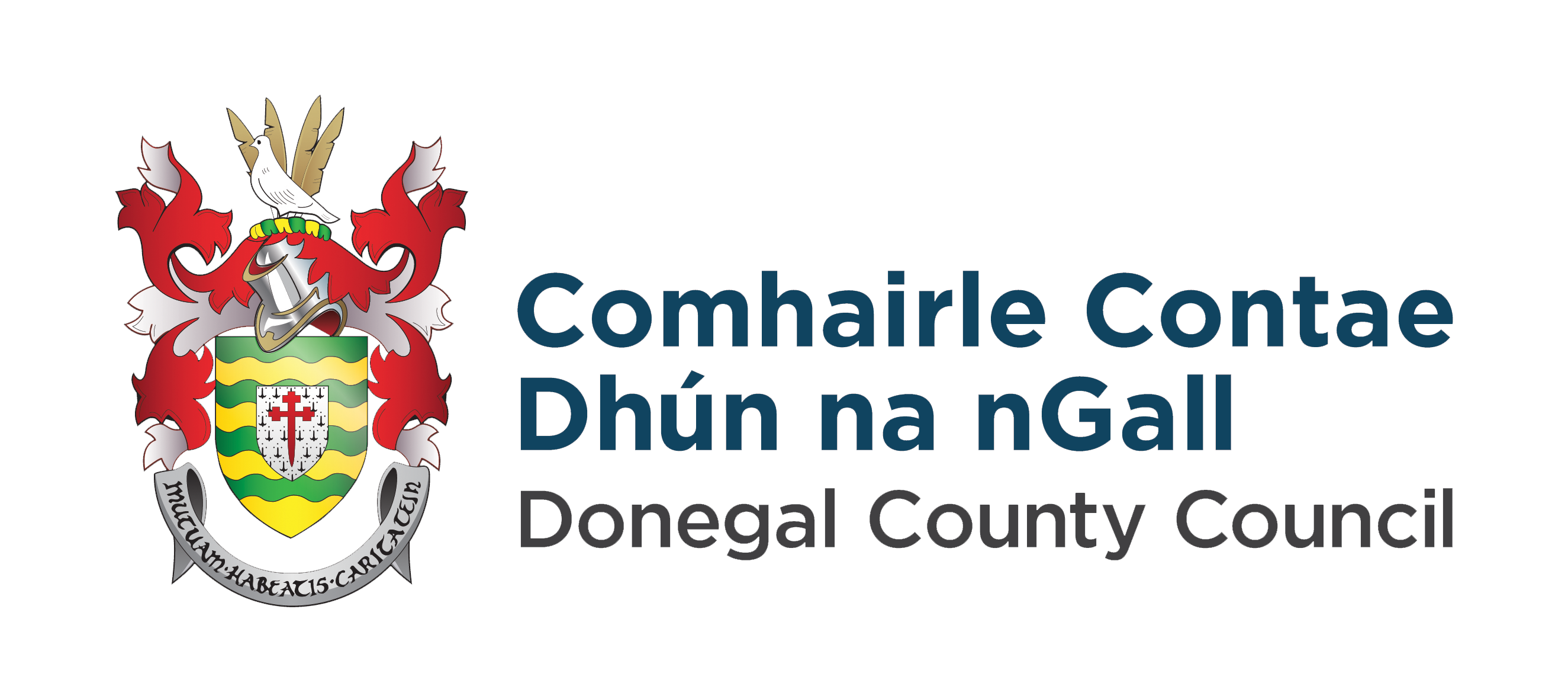Project Events

The sixth and final event of the project “YOUth and Democracy: Empowering EUrope’s Next Generation” took place in Medulin, Croatia, from May 28 to 31, 2025. This culminating gathering brought together 66 local and international participants from 18 different European countries—including youth workers, policymakers, civic-association leaders, educators, and experts—who reconvened to share outcomes, reflect on best practices, and chart a course for sustaining youth engagement in democracy beyond the 2024 European Elections.

This was the program of activities:
Wednesday, May 28, 2025
Participants arrived at Pula (PUY) or Trieste Airport and transferred to the Park Plaza Belvedere Medulin overlooking the Adriatic. The evening opened with a welcome dinner at the hotel, where attendees introduced themselves and received an overview of the event’s objectives.
Thursday, May 29, 2025 – Medulin
- 08:00 AM: Buffet breakfast at the hotel.
- 10:00 AM: Official meeting with Istria County representatives in Pula, featuring welcome addresses by County Governor Boris Miletić and Deputy Mayor Noelia Baleato Toja. Both underscored the critical role of the EU in young people’s daily lives and the necessity of making European institutions more accessible to youth
- 10:45 AM: “Getting to Know the EU” workshop at the Faculty of Economics and Tourism, led by Prof. Dean Sinkovic. His interactive session covered the EU’s history, institutions, decision-making processes, and tangible benefits for regions like Istria, capped by a team quiz that reinforced key concepts
- 11:30 AM: Coffee break and cultural visit to Pula’s Amphitheatre, Zero Strasse, and Fort Kaštel, offering insights into the region’s 2,000-year heritage.
- 02:00 PM: Lunch in Pula.
- 05:30 PM: Return to Medulin for a tour of the Youth Centre, where they shared their participatory-budgeting and civic-engagement methods.
- 08:00 PM: Dinner at the hotel with reflections on the day’s learning and networking.

Friday, May 30, 2025 – Medulin
- 08:00 AM: Breakfast at the hotel.
- 09:30 AM: Departure for Medulin Town Hall.
- 10:00 AM: “Fostering Youth Engagement in Medulin” session with Mayor Ivan Kirac, who presented local strategies—youth councils, sports and cultural clubs, and direct participatory democracy initiatives—that give young residents a real voice in municipal decision-making
- 11:30 AM: Coffee break.
- 12:00 PM: Guided visit to the Vižula Archaeological Park, exploring local heritage and its connection to community identity.
- 01:30 PM: Lunch in Medulin.
- 03:00 PM: “Ecosystems and Youth Concerns” excursion to Nature Park Kamenjak, where experts and participants discussed environmental stewardship and rural opportunity.
- 05:00 PM: Return to the hotel.
- 08:00 PM: Evaluation session, certificates of participation and farewell speeches, followed by a goodbye dinner celebrating the networks formed over six events.
Saturday, May 31, 2025
A final breakfast, check-out, and departure—ending the project’s 18-month journey across six countries.

Key Conclusions and Next Steps
Participants agreed that fostering a more inclusive and accessible democracy for young people hinges on lowering legal and practical barriers—through civic education, lowering voting age where possible, and expanding digital engagement tools like participatory-budgeting apps and online platforms—while institutionalizing local Youth Councils and participatory-budget processes to give youth a direct voice in
policymaking; they also emphasized the power of intercultural exchange, combining historical and cultural immersion with cross-border dialogue to build European identity, and committed to sustaining their network by sharing best practices via social-media campaigns, local forums, and educational workshops, ensuring that the insights from Medulin inform future EU-level initiatives and keep Europe’s next generation at the forefront of democratic life.
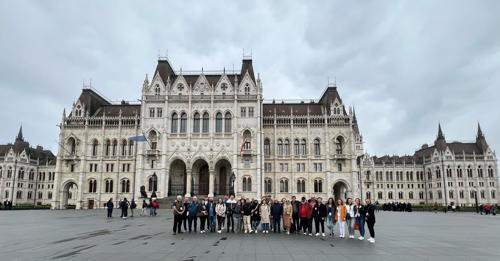
The fifth event of the project “YOUth and Democracy: Empowering EUrope’s Next Generation” took place in Pásztó, Hungary, from April 23 to 26, 2025. This vibrant gathering brought together 70 local and international participants representing 18 different European countries, including youth workers, policy-makers, civic-association leaders and educators—all united by the mission to bolster youth engagement of the 2024 European Elections.

This was the program of activities:
Sunday, April 23, 2025
Participants arrived at Budapest International Airport. That evening, a welcome dinner offered the first chance for informal networking and introductions, setting a collegial tone that carried throughout the event.
Monday, April 24, 2025
- 08:00 AM: Buffet breakfast at Hotel
- 10:15 AM: Arrival at Tittel Pál Dormitory. The morning opened with a warm welcome from Mr. Jeno Dombos, Director of the school, and a reply by Ms. Noelia Baleato Toja, Vice-Mayor of Santa Comba. Both underscored the project’s goals: promoting democratic values and youth participation at the local level
- 10:40 AM: Workshop “What Topics Are Important for Young Voters?” led by high-school students. Their survey revealed that climate action, youth employment, and affordable housing top electoral concerns; they also proposed integrating financial literacy and AI ethics into curricula, and explored measures like age quotas in political bodies and structured EU internships to open doors for first-time candidates
- 11:00 AM: Coffee break accompanied by a musical performance.
- 11:30 AM: Meeting at the Mayor’s Office with Mr. Attila Farkas, Mayor of Pásztó, featuring an exchange of gifts and a group photo.
- 01:00 PM: Traditional Hungarian lunch in Pásztó.
- 02:30–04:15 PM: Cultural discovery around the Nógrád region, including a stroll through the Garden of Ruins at Oskolamester’s House, a milling demonstration at Szalay Mill, and a visit to a local exhibition—all showcasing rural crafts, heritage and entrepreneurial spirit
- 08:00 PM: Dinner at a nearby restaurant, with participants reflecting on the day’s insights.

Tuesday, April 25, 2025
- 09:30 AM: Departure from the hotel.
- 10:00 AM: Guided tour of the Hungarian Parliament building, providing context on EU institutions and national democracy.
- 10:30 AM: Conference with the National Youth Council of Hungary, led by Ms. Anna Kovács. She detailed how the Council empowers young people through debate simulations, mentorship schemes, regional forums and digital platforms—tools that blend formal learning with practical engagement to influence policy on youth employment, housing and emancipation

Key Conclusions and Next Steps
Participants agreed that making democracy more inclusive and accessible to young people requires lowering both legal barriers (such as voting age) and practical ones (through comprehensive civic education), establishing and strengthening local Youth Councils to give young citizens a direct voice in policymaking, and deploying digital
engagement tools—like participatory budgeting apps, interactive online platforms, and youth ambassador programmes—to bridge the gap between institutions and the digitally native generation; they also emphasised the value of intercultural exchange via cross-border dialogues and service-learning projects to foster a shared European identity while addressing community-specific needs. Participants committed to maintaining the networks forged in Hungary and actively disseminating the event’s outcomes through social-media campaigns,
local forums, and school workshops, ensuring that these insights and best practices will feed into the final project meeting in Medulin and shape future EU initiatives so that Europe’s next generation remains at the heart of its democratic future.

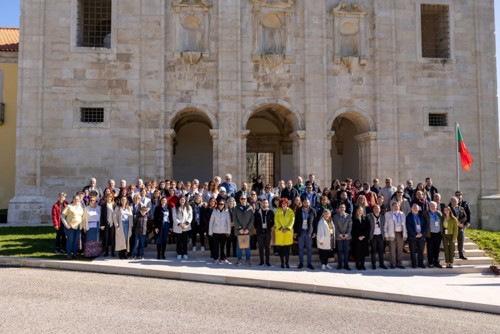
The fourth event of the project “YOUth and Democracy: Empowering EUrope's Next Generation” took place in Figueira da Foz, Portugal, from February 2 to 5, 2025. This impactful event gathered 97 local and international participants from 18 different European countries, fostering cross-cultural dialogue and collaboration to promote youth participation in democracy. The attendees included policymakers, youth leaders, experts from civic organizations, and educators, all united by a shared commitment to strengthening local democracy and engaging young people in the upcoming European Elections.
The event kicked off on Sunday, February 2, with participants arriving at Porto Airport, followed by organized transfers to Figueira da Foz, a coastal town renowned for its maritime heritage. The evening featured a welcome dinner that provided an opportunity for informal introductions and networking among the participants, setting the tone for collaboration throughout the event.
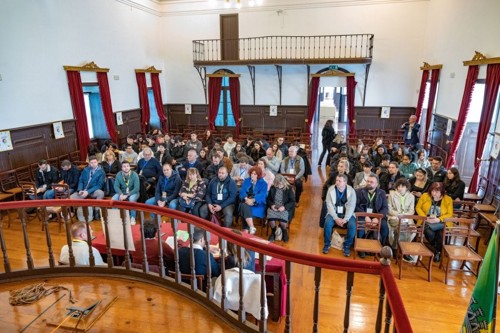
On Monday, February 3, the group visited Paiao, a village in the Figueira da Foz municipality, where the program began with a warm welcome from Mr. José Alberto Carvalho, President of Paiao, and Mr. Alberto Romar, Mayor of Santa Comba. They emphasized the importance of fostering youth participation and promoting democratic values. Following this, a youth-led video presentation showcased the local culture and heritage of Paiao, giving international participants an insight into the community’s values.
The highlight of the morning was a debate on “Young People and First-Time Voters: How to Motivate Them?” featuring a panel of esteemed speakers including Ms. Ana Oliveira, a National Deputy from the Portuguese Assembly, and Mr. José Veranda, representing the National Youth Council. The discussions centered around strategies to engage young voters, specifically first-time voters, and the role that public institutions, youth associations, and policymakers can play in motivating them. Participants actively contributed to the conversation, reflecting on their own experiences and sharing successful initiatives from their home countries.
After a traditional coffee break with live cultural music, participants enjoyed a cultural exploration of Paiao, including visits to the Seiça Monastery and the Salt Museum, which provided an opportunity to understand the local history and maritime roots of the town.
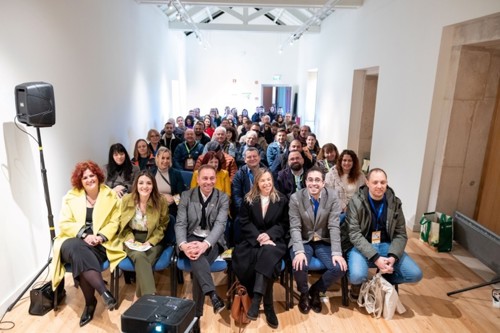
On Tuesday, February 4, the group returned to Figueira da Foz for further sessions. They met with Mr. Pedro Santana Lopes, the mayor of Figueira da Foz, and participated in a conference led by Ana Catarina Mendes, a Member of the European Parliament. Mendes delivered a compelling address about the challenges facing youth in the 2024-2029 European Parliament legislature. She spoke about the importance of bridging the gap between young people and European institutions, particularly in more peripheral regions like Figueira da Foz. Mendes proposed initiatives aimed at making the European Parliament more accessible to youth, such as increasing outreach in schools and universities and promoting transparency in decision-making processes. This was followed by a group photo, capturing the spirit of unity and collaboration among the delegates.
Later, participants had the chance to explore the local markets, learning about Figueira da Foz’s maritime culture through a guided visit to the fish and seafood market. The cultural immersion continued with a visit to the Museum of Salt, where participants gained deeper insight into the region's salt production and its significance to the local economy. Lunch in Figueira da Foz offered another opportunity to sample traditional Portuguese cuisine.
On Wednesday, February 5, the event wrapped up with breakfast, check-out, and final goodbyes. Before departing, participants had a chance to reflect on the key takeaways from the event and discuss how to continue the momentum toward empowering youth in democracy. The farewell dinner was a moment to celebrate the connections made, the lessons learned, and the collective commitment to youth participation in European governance.

Key conclusions from the event highlighted the critical importance of making democracy more inclusive and accessible to young people. Several strategies were proposed, including the use of social media campaigns to engage young voters, lowering the voting age, and creating local Youth Councils to provide young people with a direct voice in decision-making. The event also emphasized the need for political education in schools and universities, where young people could learn about the power of their vote and the impact of democratic processes on their lives.
The participants agreed that the next steps should involve continued collaboration and networking, with a focus on disseminating the outcomes of the event across the EU. The insights gained from this gathering will contribute to future initiatives aimed at encouraging youth participation in elections, ensuring that the next generation of Europeans is actively involved in shaping the future of their societies and the European Union.

The second event of the "EU4YOUth" Network of Towns project, organized under the CERV Programme, was hosted in Pavlikeni, Bulgaria, from September 9 to 12, 2024. This initiative, led by the Municipality of Santa Comba, Spain, and supported by 19 partners from 18 EU countries, aimed to empower European youth and enhance citizen participation in democratic processes, particularly in light of the 2024 European Elections. Over 85 participants from across Europe, along with local citizens, policymakers, and experts, gathered to discuss pressing issues and share ideas for fostering democratic engagement and inclusion.
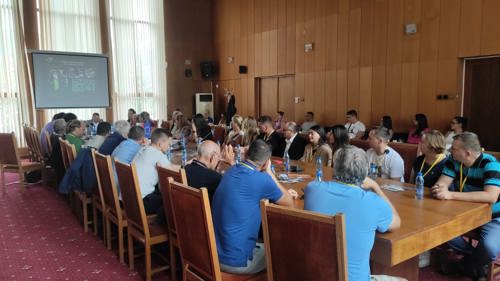
The event’s key objectives included raising awareness of the significance of democratic participation, particularly among young people, promoting collaboration among European towns, and addressing challenges such as voter apathy and digital inclusion. These discussions took place in a setting designed to inspire intercultural dialogue, knowledge exchange, and practical solutions for engaging citizens in the EU’s democratic processes.
A series of conferences and debates marked the event’s intellectual core. Prominent speakers included Ivailo Zdravko, Regional President, who emphasized empowering young people to engage in local initiatives, and Daniel Panov, Mayor, who highlighted the critical role of education in fostering informed and active citizenship. Patricia Val, Vice Mayor of Santa Comba, delivered an address on digital technologies' role in increasing youth participation in politics. Together, these sessions explored themes such as the outcomes of the 2024 European Elections and strategies to strengthen youth involvement in shaping Europe’s future.

Workshops provided an interactive space for participants to explore participatory democracy, youth-led initiatives, and policy inclusivity. Highlights included a masterclass by Olga Stoyanova, a political science expert, who discussed fostering equality and inclusion, and an engaging session by Francisco Javier Ulloa, who presented best practices in participatory budgeting. These workshops were widely praised for their practical insights and opportunities for dialogue.
Participants also immersed themselves in Bulgarian culture through guided tours of historical landmarks, such as the Fortress of Tsarevets and the Thracian Pottery Complex, as well as traditional Bulgarian music and dance performances. These cultural experiences enriched the event by fostering a deeper appreciation of the region’s heritage and traditions, further enhancing intercultural understanding.

Suggestions included offering more free time for participants to explore local attractions independently and incorporating additional informal networking opportunities.
The event's impact was amplified through press releases and local media coverage, social media updates and posts showcasing event highlights, materials collected during the event will be used to create an e-book, documenting insights and best practices for wider dissemination.
The next meeting, planned in Rabat, Malta, will build on the same achievements, continuing the project’s mission to inspire and connect citizens across Europe.
The first meeting of the project entitled “Youth and democracy: Empowering EU next generations” was celebrated in Santa Comba (Galicia, Spain) from the 1st to the 4th of February.
The project, funded by the European Commission through the CERV program, gathered more than 90 direct participants including young people from Santa Comba who actively introduced Galicia and their local town to the 38 international participants.
During the program of activities, the different participants had time to introduce their localities, speak about European issues such as the upcoming European elections, getting to know European services like Europe Direct. There was time to hold meetings with local politicians and visit democratic institutions such as the Provincial government of A Coruña.
The promoter is the Municipality of Santa Comba (Spain) who organized a symbolic town twinning between the 19 partners and 18 participant countries. Representatives from each entity signed a brotherhood oath to respect and promote European values such as democracy, tolerance or peace.
Next September, a new event will be held in Sofia (Bulgaria) and will focus on the analysis of the results of the European elections. Furthermore, there will be time to reflect about the challenges that the new European government must address to improve the quality of life of its citizens at local level.
These projects are a very important opportunity to promote European citizenship at local level, involving and engaging citizens from different areas, especially young people.

